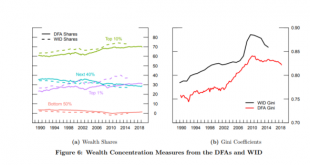from Ken Zimmerman Today there is as much, if not more consensus among scientists about global climate change as there was 300 years ago about the laws of thermodynamics and the laws of motion. Polling shows that majorities of “ordinary” people in the USA, Europe, Asia, etc. accept the conclusions of this science. Yet around the world opposition to the science of climate change is well funded, unyielding, and denies the science at the highest levels of government and science. What...
Read More »The spectre of higher oil prices
from C .P. Chandrasekhar and Jayati Ghosh On May 2, the Trump administration brought to an end the waiver the US had granted eight countries, including India, of sanctions on imports of oil from Iran. Having pulled out of the 2015 multi-country agreement with Iran to limit its nuclear programme, the US government had invoked the nuclear threat from that country to impose sanctions. The most damaging element of those sanctions for both Iran and the world’s oil importers was the ban this...
Read More »Changing economics
from Steve Keen The pedagogic pressure from students and the wider community has to be matched by the accelerated development of alternatives to neoclassical economics. Though we know much more today about the innate flaws in neoclassical thought than was known at the time of the Great Depression (Keen 2001), the development of a fully-fledged alternative to it is still a long way off. There are multiple alternative schools of thought extant – from Post Keynesian to Evolutionary and...
Read More »Open thread May 7, 2019
Revisiting the foundations of randomness and probability
from Lars Syll Regarding models as metaphors leads to a radically different view regarding the interpretation of probability. This view has substantial advantages over conventional interpretations … Probability does not exist in the real world. We must search for her in the Platonic world of ideals. We have shown that the interpretation of probability as a metaphor leads to several substantial changes in interpretations and justifications for conventional frequentist procedures. These...
Read More »HM Athens: Greeks bearing gifts
Some brief comments regarding a plenary session in HM ATHENS 2019 Michael Roberts offered in his blog a detailed presentation of the plenary in which he participated together with J.Milios and C.Lapavitsas (which is rebloged underneath). Following is my take regarding this debate. The plenary session to which M.Roberts is refering was truly revealing of the inadequacies and the problematic character of the Financialisation ‘fashion’. John Milios argued that capitalism was alsways...
Read More »New distributional financial accounts from the Federal Reserve!
The Federal Reserve (Fed) publishes the Flow of Funds. It has recently made an important addition to these invaluable financial data: quarterly distributional financial accounts. They are more frequent, more detailed and much faster than existing accounts. Why did they do this? For one thing: distributional accounts are not a new idea. As stated in their first footnote (but note the gap between the fifties and 2014): For example, Carroll (2014) cites the need for distributional national...
Read More »Economic causes never act in a socio-economic vacuum
from Lars Syll Our observations and theories are concept-dependent without therefore necessarily being concept-determined. There is a reality that exists independently of our knowledge and theories. Although we cannot comprehend it without using our concepts and theories, these are not the same as reality itself. Social science is relational. It studies and uncovers the social structures in which individuals participate and position themselves. It is these relations that have sufficient...
Read More »Evidence and conventional wisdom
I’ve been looking over some posts from the bright dawn days of blogging in the early 2000s. One thing that struck me is that some ideas I put forward as unconventional but evidence based, are now fairly widely accepted. In view of the widespread, and justified, concern about a post-truth era, this seems encouraging, and worth investigating. A few examples In this post on equality of opportunity from 2003, I noted that “contrary to popular belief, there is less mobility between...
Read More »Critical thinking is not always appreciated
from Peter Söderbaum Economists like other people are political economic persons guided by their ideological orientation. We are eager to become accepted in some social groups. Just as political parties often are afraid of departing too much from one another, an economist may prefer a comfortable life by positioning herself close to other economists with respect to conceptual framework and ideology. Accepting the norms and standards of neoclassical economics is rewarding and constitutes...
Read More » Heterodox
Heterodox




